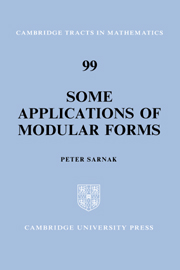Introduction
Published online by Cambridge University Press: 05 February 2012
Summary
Traditionally the theory of modular forms has been and still is, one of the most powerful tools in number theory. Recently it has also been successfully applied to resolve some long outstanding problems in seemingly unrelated fields. Our aim in this book is to describe three such applications, developing along the way the necessary methods and material from the theory of modular forms. Briefly, the problems we examine are the following:
(A) Ruziewicz's problem.
The problem is whether the Lebesgue measure λ on the n-sphere Sn is the unique rotationally invariant mean on L∞(Sn). To put it in another context, an amenable topological group G is one which carries an invariant mean on L∞(G). Uniqueness of such a mean is a difficult question and seldom discussed. Actually, Ruziewicz in the 1920's posed the problem of the uniqueness of rotationally invariant finitely additive measures defined on Lebesgue sets on Sn. The relation between these problems is that an invariant mean on L∞(Sn) is a finitely additive measure v which is moreover absolutely continuous with respect to Lebesgue measure λ, i.e., v(E) = 0 whenever λ(E) = 0. Tarski [Tar] has remarked that it follows from the Hausdorff–Banach–Tarski paradoxical decompositions of Sn, n ≥ 2, that any rotationally invariant finitely additive measure on Sn, n ≥ 2, must be absolutely continuous with respect to λ. Hence for n ≥ 2 the invariant mean and Ruziewicz problems are equivalent.
- Type
- Chapter
- Information
- Some Applications of Modular Forms , pp. 1 - 4Publisher: Cambridge University PressPrint publication year: 1990

